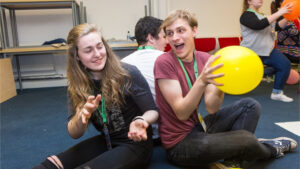Getting to Know Youth Work
These pages will help you introduce volunteers to the principles of youth work. They can be used to provide guidance in the induction process or they can be printed off and given to new volunteers as handouts.

Effective youth work helps young people to learn about themselves, others and society through non-formal educational activities which involve enjoyment, challenge and learning.
The purpose of youth work:
- Build the self-esteem and self-confidence of young people.
- Develop young people’s ability to manage personal and social relationships.
- Create learning opportunities and to develop new skills for young people.
- Encourage positive group atmospheres.
- Build the capacity of young people to consider risk, make reasoned decisions and take control.
- Develop a ‘world view’ which widens horizons and invites social commitment.
The age range youth work covers:
Youth work is usually described as focussing on young people aged 11-25. However, many clubs and groups may also be involved in providing services to children under 11 and it is important to build good links with these services and to support children and young people’s transitions.
Where youth work takes place:
- youth clubs and youth centres
- uniformed and voluntary youth organisations
- youth counselling units
- outreach and detached projects
- youth cafes
- youth arts groups
- youth action and participation groups
- drug and alcohol projects
Although the programmes, activities and settings for youth work may range, the core values and principles are consistent and key to achieving the above purpose.
Youth work has three essential and definitive features:
- Young people choose to participate: The young person takes part voluntarily. She/he chooses to be involved, not least because they want to relax, meet friends and have fun. The young person decides whether to engage or to walk away.
- Youth work must build from where young people are: Youth Work operates on young people’s own personal and recreational territory – within both their geographic and interest communities. The young person’s life experience is respected and forms the basis for shaping the agenda in negotiation with peers and youth workers.
- Youth Work recognises the young person and the youth worker as partners in a learning process: The young person is recognised as an active partner who can, and should, have opportunities and resources to shape their lives. The relationship and dialogue between the young person and youth worker is central to the learning process.
Taken from the Statement on the Nature and Purpose of Youth Work, YouthLink Scotland
Youth work is recognised as a part of the Community Learning and Development (CLD) field in Scotland along with adult learning and community capacity building. The CLD Standards Council has issued a set of competences which it thinks that everyone working within CLD ( including Youth Work ) should be able to demonstatrate. See the CLD Comptency Wheel for more info.
The CLD Standards Council is also responsible for the registration of CLD practitioners, the approval of training courses, and the continuing professional development of the sector workforce. Visit CLD Standards Council for more info.